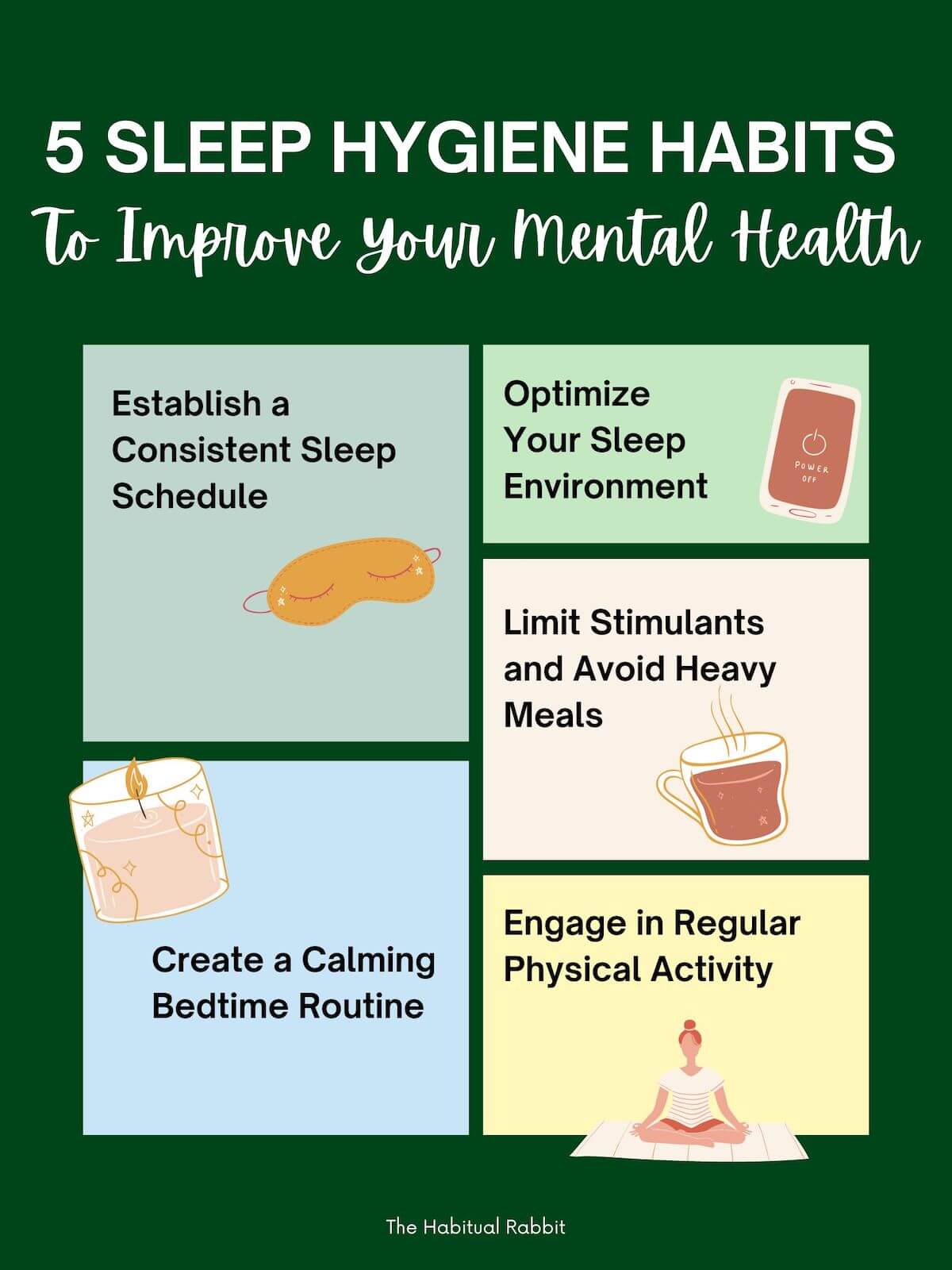
Many of us underestimate the importance of getting a good night’s sleep, and with busy schedules in a fast-paced world, our sleep is often pushed to the bottom of the list. After all, we only need a few hours of sleep, right? Wrong.
Research consistently shows that sleep plays a crucial role in our mental health and overall well-being. If you’re not getting enough sleep, you might notice a lack of mental clarity, mood swings, and constant fatigue.
When I was younger, falling asleep was no problem. I could literally fall asleep anywhere — on the bus, a friend’s couch, hell, I even fell asleep at a bar once.
But as I got older, I noticed that it was taking me longer to fall asleep, and when the environment wasn’t right, my sleep didn’t feel like sleeping at all!
I had an extremely busy schedule working 2-3 jobs while trying to maintain some sort of social life, so sleep was certainly not a priority.
That was until it started to affect my performance. I knew I had to make some serious changes and move sleep up the list. And it was very hard. Creating sleep hygiene habits took a lot of time, a lot of trial and error, and tons of adjustments.
But after trying certain routines consistently, something finally stuck.
If you’re here, then you’ve probably struggled with getting good-quality sleep and are in need of better sleep hygiene. If you don’t prioritize this now and establish better sleep habits, it will eventually catch up to you in the long run.
Lucky for you, Kevin and I have experimented with numerous sleep habits and found the top 5, most effective sleep hygiene habits that will improve your mental health, physical health, and overall well-being.
Learn more about how sleep affects your mental health.

1. Establish a consistent sleep schedule
In this blog, you’re going to hear this over and over again. Consistency is key.
The most important part of getting good sleep is establishing and maintaining a consistent sleep schedule. This is because our bodies have internal clocks, known as circadian rhythms, that regulate our sleep-wake cycles.
These rhythms are influenced by external cues, like light exposure and daily routines. When we have a consistent sleep schedule, going to bed and waking up at the same time every day, even on weekends, we synchronize our circadian rhythms and promote more restful and refreshing sleep.
Studies have shown that having irregular sleep patterns contributes to reduced cognitive function and focus, lack of emotional regulation, and increased health problems like heart disease, high blood pressure, and obesity. By maintaining a consistent schedule, we support our body’s natural sleep-wake cycle, making it easier to fall asleep and wake up feeling refreshed.
So, where do you begin?
Start by deciding on a time when you will go to sleep and when you will wake up, aiming for 7-9 hours of sleep per night, as recommended by sleep experts. This might be difficult at first, especially if you have a hard time falling asleep. But try to stick to this schedule, even on weekends or days off. Over time, your body will adjust to this routine, and you’ll find it easier to fall asleep and wake up naturally, without relying on alarms or feeling groggy.
Remember to give yourself some grace, and if a certain schedule doesn’t work, make adjustments and try again.
2. Create a calming bedtime routine
If you’re like me, then you probably have a hard time falling asleep, sometimes taking 30 minutes to an hour just to ease into sleep. I would lay there, tossing and turning in bed with my body feeling tired but my mind unable to rest. This can be extremely frustrating.
So I tried something new and created a calming bedtime routine that would allow my mind and body to ease into sleep.
Creating a calming bedtime routine can help signal your body and mind that it’s time to wind down and prepare for sleep. Instead of jumping from a busy work day with an overloaded to-do list right into bedtime, set up a transition period that includes relaxing activities before bed so that your body knows you’re about to switch modes.
It’s also extremely important to avoid using electronics right before bed. Phone screens emit blue light, which suppresses the production of melatonin, a hormone that regulates sleep, making it harder to fall asleep. This means that you’ll need to stop scrolling on your phone while in bed, hoping that scrolling through social media and watching YouTube will help you fall asleep because it won’t. Not only will it increase the time it takes for you to fall asleep, but you’ll also feel even more tired and groggy in the morning.
Lastly, try not to engage in stimulating activities close to bedtime including intense exercise, watching thrilling or suspenseful movies or TV shows, or taking important work calls. These activities will get your mind going, making it harder to transition into relaxation and sleep.
Now, for the best part!
Here are some activities you can incorporate into your bedtime routine to promote relaxation and restfulness:
- Read a book
- Take a warm bath or shower
- Deep breathing
- Meditation (sleep meditations are great for calming the mind!)
- Listen to soothing instrumental music
If you’re interested, here is my calming bedtime routine that has worked time and time again:
- Take a warm shower
- Light stretching
- Stop using electronics one hour before bed
- Listen to soothing music (there are great playlists for sleep on Spotify!)
- Sleep meditation and deep breathing
3. Optimize your sleep environment
I cannot stress this enough. Your bedroom should be for sleeping and sleeping only! Think of your bedroom as a haven for relaxation, with conditions that promote restful sleep.
First, consider the temperature of your sleeping environment. The ideal temperature for sleep is generally between 60 and 67 degrees Fahrenheit (15 to 19 degrees Celsius). Cooler temperatures help signal to your body that it’s time to sleep and can prevent overheating during the night.
When our body is cool, we can sleep better. It’s as simple as that.
Next, pay attention to the noise level in your bedroom. Excessive noise or sudden disruptions can disturb your sleep and prevent you from entering deeper sleep stages. If you’re sensitive to sound, consider using earplugs, white noise machines, or earphones with calming sounds to block out disruptive noises and create a peaceful sleep environment.
Another crucial factor is the darkness of your sleeping environment. Exposure to light, even dim light, can interfere with your body’s production of melatonin, disrupting your sleep. Invest in blackout curtains or blinds to keep your bedroom as dark as possible. If complete darkness is not achievable, consider using an eye mask to block out any remaining light.
The comfort of your bed also plays a significant role in your sleep quality. I didn’t realize this until I started having neck and back pain. The right mattress and pillows make a huge difference, so choose a mattress and pillows that suit your sleep preferences, providing enough support and comfort for your rest.
Something extra that I like to have in my bedroom that helps me ease into sleep is an essential oil diffuser or candle. I usually like to use the diffuser because I can set the time for it to turn off automatically. Sometimes I light a candle before I actually start easing into sleep because it sets a relaxing mood that gets me ready for bedtime. For both the diffuser and candle, I like to use scents that promote relaxation and sleep like lavender, eucalyptus, and chamomile.
Lastly, keep electronic devices out of your bedroom or at least away from your sleeping area. I usually put my phone on silent and charge it on the other side of the bedroom to prevent my urge to look at it. Make your bedroom a device-free zone to minimize distractions and create a space dedicated solely to relaxation and sleep.
4. Limit stimulants and avoid heavy meals
You might not think about this, but what you consume throughout the day can significantly impact your sleep quality. Certain substances and dietary habits can interfere with your ability to fall asleep and have quality, restorative sleep.
Limit your caffeine intake, especially in the afternoon and evening. This one is a no-brainer. Because its effects can last for several hours, caffeine can have a significant impact on your sleep. Be mindful of hidden sources of caffeine, such as certain medications, tea, or soft drinks, and opt for caffeine-free alternatives whenever possible.
Nicotine is another substance that can interfere with sleep. Nicotine is a stimulant and can disrupt your ability to fall asleep and stay asleep. If you’re a smoker, consider quitting for the sake of your sleep quality and overall health.
Avoid heavy meals and eat dinner earlier. I like to eat dinner 3 to 4 hours before my bedtime so that my body has enough time to digest. Digestion requires energy and can interfere with your body’s ability to relax and prepare for sleep, so heavy meals close to bedtime can lead to discomfort and make it harder to fall asleep. If you’re hungry before bed, opt for light, sleep-friendly snacks such as a small portion of yogurt, a banana, or a handful of nuts.
Finally, avoid alcohol before bed. I know many of us like to enjoy a glass of wine before sleep because it helps us fall asleep faster, but it can actually disrupt your sleep later in the night. Alcohol reduces the amount of time spent in rapid eye movement (REM) sleep, the stage associated with vivid dreams and emotional processing. Therefore, you may wake up feeling groggy and unrested.
5. Engage in regular physical activity
You might not think of exercise as an important part of your sleep hygiene, but regular physical activity plays a vital role in improving sleep quality and promoting better mental health. Because exercise promotes the release of endorphins, known as “feel-good” hormones, it can help reduce stress and anxiety levels, leading to improved sleep while enhancing mood and increasing feelings of well-being.
Personally, I find that exercising in the morning gets me energized and increases my focus and productivity for the day, and makes me tired enough by the end of the day that I find myself falling asleep faster with better quality sleep through the night.
In addition to the physical activity itself, spending time outdoors can also have a positive impact on your sleep. Exposure to natural light during the day helps regulate your circadian rhythms and reinforces your body’s sleep-wake cycle. If possible, incorporate outdoor activities into your daily routine, such as taking a walk during your lunch break or practicing outdoor exercises.
Again, it’s important to exercise but don’t do it too close to your bedtime because it can have a stimulating effect on the body and make it harder to wind down for sleep.
Final Thoughts
Not getting enough sleep can have severe health consequences, especially as you get older. So it’s important to have good sleep hygiene that includes a bedtime routine that promotes relaxation and optimizes your sleep quality.
Establishing sleep hygiene habits can look different for everyone, so remember to try different routines and always do what works best for you. It may time some time to adjust, but stay consistent and patient with yourself.
By establishing a consistent sleep schedule, creating a calming bedtime routine, optimizing your sleep environment, limiting stimulants and heavy meals, and engaging in regular physical activity, you can pave the way for better sleep and improved mental health. Prioritize your sleep, and you’ll reap the rewards of enhanced cognitive function, emotional well-being, and overall mental resilience, leading to a happier and healthier life.
Happy sleeping!
